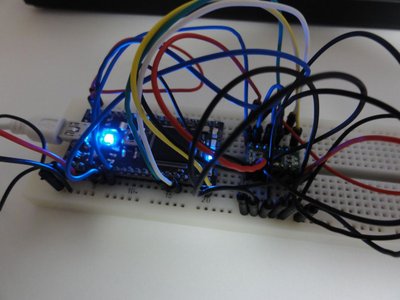MMA7455L connected via SPI
This is just the first attempt to work with MMA7455L.

- MMA7455L sensor module http://strawberry-linux.com/catalog/items?code=12102
- Code is based on the following application note: http://strawberry-linux.com/pub/AN3468.pdf
- CS should be connected to any pin other than P19 which is off(0); I'm not sure but controlling CS does not work as expected.
- Pulse Detection does not work though P15 is flagged; what should I do next?
- 10bit is only enabled for 8g according to page 15 of the spec. above.
- It seems that we should accumulate values (for a delta time) from a sensor to get consistent result.
- LEDs is used to indicate the activities on those sensors.
- Add negative number support (for reading 10-bit value)
// Testing MMA7455L SPI
#include "mbed.h"
SPI spi(p5, p6, p7);
DigitalOut cs(p19);
InterruptIn int1(p15), int2(p16);
Serial pc(USBTX, USBRX);
DigitalOut led1(LED1), led2(LED2), led3(LED3);
int read(int reg) {
cs = 0;
int v = spi.write(reg << 1);
cs = 1;
return v;
}
void write(int reg, int val) {
cs = 0;
spi.write(0x80 | (reg << 1));
spi.write(val);
cs = 1;
}
int read10(int reg) {
cs = 0;
int v = spi.write(reg << 1);
v |= spi.write((reg + 1) << 1) << 8;
if(v & 0x200)
v = v - 1024;
cs = 1;
return v;
}
int readSensorDirect(int sensor) {
return read10(sensor * 2);
}
const int SENSBUFSIZE = 100;
int sensbuf[3][SENSBUFSIZE];
int sens_ptr = 0;
void reset()
{
for(int i = 0; i < 3; i++)
{
int offset = readSensorDirect(i);
write(0x10 + i * 2, offset * 2);
}
memset(sensbuf, 0, sizeof(sensbuf));
}
void accumulate()
{
for(int i = 0; i < 3; i++)
sensbuf[i][sens_ptr] = readSensorDirect(i);
sens_ptr++;
if(sens_ptr == SENSBUFSIZE)
sens_ptr = 0;
}
int readSensor(int sensor)
{
int* buf = sensbuf[sensor];
int a = 0;
for(int i = 0; i < SENSBUFSIZE; i++)
a += buf[i];
return a;
}
void int1_raised() {
pc.printf("1\n");
//pc.printf("1: %06d,%06d,%06d\n", readX(), readY(), readZ());
}
void int2_raised() {
pc.printf("2\n");
//pc.printf("2: %06d,%06d,%06d\n", readX(), readY(), readZ());
}
const int INDSIZE = 5;
const int FULLSIZE = INDSIZE * 2 + 1;
void bar(char* ind, int v)
{
memcpy(ind, "..........|.........." + (10 - INDSIZE), FULLSIZE);
if(v < 0)
{
char* p = ind + INDSIZE - 1;
for(int i = 0; i < INDSIZE; i++)
{
if(v) *p = '#';
p--;
v /= 5;
}
}
else
{
char* p = ind + INDSIZE + 1;
for(int i = 0; i < INDSIZE; i++)
{
if(v) *p = '#';
p++;
v /= 8;
}
}
}
int main() {
wait_ms(300);
spi.format(8, 0);
spi.frequency(1 * 1000* 1000);
// Device ID
read(0xf);
pc.printf("WHOAMI: %02X\n", read(0xf));
// $16: Mode Control Register
// 0x0: Standby Mode
// 0x1: Measurement Mode
// 0x2: Level Detection Mode
// 0x3: Pulse Detection
int mode = 0x2;
// 0x0: 8g
// 0x8: 4g
// 0x4: 2g
int glv = 0x0;
read(0x16);
write(0x16, glv | mode);
pc.printf("Mode Control Register: %02X\n", read(0x16));
// Optimal Settings for Freefall using Level Detection
// 1. THOPT=0 Absolute Condition
// 2. ZDA=0 Enable Z, YDA=0 Enable Y, XDA=0 Enable X
write(0x18, read(0x18) & 0x87);
// 3. Negative AND Logia Set LDPL
write(0x19, read(0x19) & 0x1);
// 4. Set Threshold = 1 g
write(0x1a, 0x10);
/*
// Optimal Settings for Motion using Level Detection
// 1. THOPT=0 Absolute Condition
// 2. ZDA=1 Disable Z, YDA=0 Enable Y, XDA=0 Enable X
write(0x18, (read(0x18) & 0x87) | 0x20);
// 3. Positive OR Logic Clear LDPL
write(0x19, read(0x19) & 0xfe);
// Set Threshold to 2 g
write(0x1a, 0x20);
*/
/*
// Optimal Settings for Single Pulse Detection
// 1. Positive OR Logic PDPL=0
write(0x19, read(0x19) & 0xfd);
// 2. X,Y,Z enabled
write(0x18, read(0x18) & 0x87);
// 3. PDTH (Pulse Threshold) set to 4 g
write(0x1b, 0x40);
// 4. PD (Pulse Duration) set to 8 ms
write(0x1c, 0x80);
*/
int1.rise(int1_raised);
int2.rise(int2_raised);
reset();
for(int i = 0;; i++)
{
wait_us(100);
accumulate();
int x = readSensor(0);
int y = readSensor(1);
int z = readSensor(2);
led1 = x / 100;
led2 = y / 100;
led3 = z / 100;
if (i % 100 == 0)
{
char buf[FULLSIZE * 3 + 3];
memset(buf, ' ', FULLSIZE * 3 + 2);
buf[FULLSIZE * 3 + 2] = 0;
bar(buf, x);
bar(buf + FULLSIZE + 1, y);
bar(buf + (FULLSIZE + 1) * 2, z);
pc.printf("P:%s\n", buf);
}
}
}
1 comment
#
05 Aug 2011
You need to log in to post a comment


Thanks for the code,
could you post a wiring diagram as I'm unsure which pins MISO and MOSI are connected to on the MMA7455.
Thanks again,
Sam